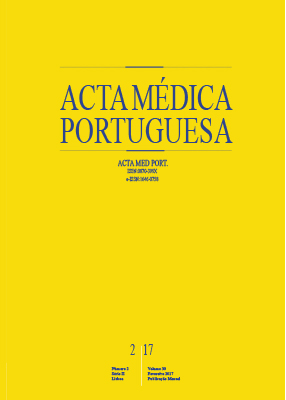Medicina Forense e a População Militar: Registos Dentários Internacionais e Sensibilização para a Identificação Humana
DOI:
https://doi.org/10.20344/amp.7703Palavras-chave:
Odontologia Forense, População Militar, Portugal, Registos DentáriosResumo
Introdução: Esta investigação teve o intuito de procurar conhecer o comprometimento global relativamente à organização e arquivo dos registos dentários e compará-lo com o risco de segurança de cada país. Por outro lado, procurou-se estudar os processos clínicos de uma amostra da população militar Portuguesa, utilizando-se para o efeito os registos dentários.
Material e Métodos: Foi enviado um e-mail para associações dentárias e solicitada informação sobre o tempo de guarda dos registos dentários. Após autorização prévia da Comissão de Ética, a informação foi recolhida através do sistema Forensic Dental Symbols® para Dental Encoder®, como uma extensão de uma investigação realizada em Espanha e utilizada a codificação genérica (dentes sãos, com restaurações, ausentes e coroas).
Resultados: Globalmente, dez anos após o último tratamento, foi o procedimento mais comum relativamente ao tempo de guarda dos documentos. Após observação dos registos dentários da amostra (595 militares) verificou-se um total de 19 040 dentes analisados, com as seguintes frequências: dentes sãos (89,6%), com restauração (7,0%), ausentes (2,2%) e coroas (1,1%).
Discussão: Existe grande variedade de orientações sobre quanto tempo têm que ser guardados pelos profissionais de saúde os seus registos. Nos registos dentários da população militar deve-se incluir informação detalhada de cada dente, de maneira a suportar o processo de identificação humana.
Conclusão: Este artigo reforça a necessidade de registos dentários de qualidade em todos os países, com manutenção eficiente para a identificação humana. Na população militar torna-se especialmente importante, devido ao facto de este ser um grupo sujeito a riscos acrescidos.
Downloads
Downloads
Publicado
Como Citar
Edição
Secção
Licença
Todos os artigos publicados na AMP são de acesso aberto e cumprem os requisitos das agências de financiamento ou instituições académicas. Relativamente à utilização por terceiros a AMP rege-se pelos termos da licença Creative Commons ‘Atribuição – Uso Não-Comercial – (CC-BY-NC)’.
É da responsabilidade do autor obter permissão para reproduzir figuras, tabelas, etc., de outras publicações. Após a aceitação de um artigo, os autores serão convidados a preencher uma “Declaração de Responsabilidade Autoral e Partilha de Direitos de Autor “(http://www.actamedicaportuguesa.com/info/AMP-NormasPublicacao.pdf) e a “Declaração de Potenciais Conflitos de Interesse” (http://www.icmje.org/conflicts-of-interest) do ICMJE. Será enviado um e-mail ao autor correspondente, confirmando a receção do manuscrito.
Após a publicação, os autores ficam autorizados a disponibilizar os seus artigos em repositórios das suas instituições de origem, desde que mencionem sempre onde foram publicados e de acordo com a licença Creative Commons









